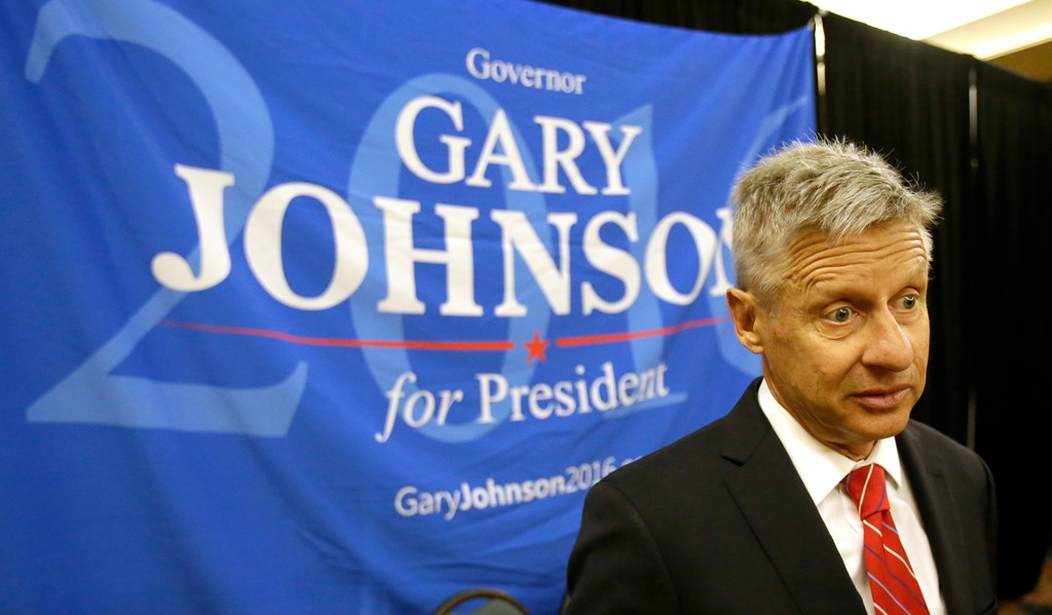With the Libertarian Party’s Gary Johnson and the Green Party’s Jill Stein together expected to capture ten percent or more of the popular vote in November (according to recent polls), it’s easy to imagine one or the other as this year’s Ralph Nader, deciding the outcome of a close election by giving one or more pivotal battleground states to either Hillary Clinton or Donald Trump. Al Gore’s supporters have never forgiven Nader for his presence on the presidential ballot in 2000 because their candidate needed only 600 of Nader’s 97,000 votes in Florida that year to win the White House.
The knee-jerk impulse to blame third party candidates for failed presidential campaigns is nothing new. The most famous case occurred in 1912 when Theodore Roosevelt captured 27 percent of the popular vote and finished ahead of the incumbent Republican president, William Howard Taft. Ever since conservatives have blamed Teddy for elevating the Democrat Woodrow Wilson to the White House, but as with Gore and Nader this is feel-good finger-pointing that exonerates the real guilty party—the failed presidential candidate himself.
In all likelihood Woodrow Wilson would have won the presidency in 1912 even if Roosevelt had not been on the ballot given the antipathy “progressive” Republicans had for the sitting president, Taft. Roosevelt bore no responsibility at all for this schism within the party. In fact, he always tried to promote party harmony, successfully encouraging progressive Republicans to support Taft for president in 1908. When the war between Taft and the progressives erupted in 1909 Teddy was on a hunting trip in Africa. He was deeply disturbed when he heard the news that the governing coalition he had painstakingly created during his own presidency had disintegrated.
Progressive Republicans felt betrayed by Taft, who broke his promise to lower the protective tariff, which artificially inflated consumer prices and thereby imposed an indirect tax on every American family. If Roosevelt had not run, they would have rallied behind Senator Robert Lafollette of Wisconsin as their candidate, voted for the “progressive” Democrat Woodrow Wilson or simply stayed at home on election day. Few, if any, would have voted for Taft—a candidate they despised as a sham reformer and the cat’s-paw of Robber Baron plutocrats.
Recommended
Roosevelt has been vilified as a selfish ego-maniac for his third party run in 1912, for letting his personal anger at Taft get in the way of what was best for the country, but this criticism does Teddy a gross injustice. With his uncanny ability to meld the competing wings of the Republican Party together, he was the only candidate who could have united conservatives and progressives during a period of unprecedented intra-party warfare. It is telling that Roosevelt voluntarily gave up the presidency in 1909 at the height of his popularity while Taft refused to do the same in 1912 even though his political support both within and outside the Republican Party had collapsed.
Teddy Roosevelt never accepted the blame for putting Woodrow Wilson in the White House, nor should he have given Taft’s treachery that year. Winning nine out of the thirteen primaries, Teddy trounced Taft in the nominating elections, even winning Taft’s home state of Ohio. With 65 percent of the party backing the progressives Roosevelt (51 percent) and LaFollette (14 percent), Taft suffered a humiliating defeat at the ballot box (35 percent) and yet shamelessly stole the nomination from Teddy at a convention rigged by the corrupt party bosses who controlled the Republican Party.
If Taft had been a savvy political operator he could have prevented Roosevelt from running in the first place, but instead actually pushed his former benefactor into the contest for the Republican Party’s presidential nomination by filing an anti-trust lawsuit against U.S. Steel in October, 1911. The suit infuriated Roosevelt because it proclaimed that the renowned “Trust Buster” had been “duped” by J.P. Morgan during the Panic of 1907 when Morgan secured Roosevelt’s promise not to prosecute the world’s largest trust when it gobbled up its largest competitor, the Tennessee Coal and Iron corporation. Roosevelt had given this promise in order to prevent a nation-wide economic collapse. He ran for the White House in 1912 in part because he wanted to be remembered as a fighter, not a fool; and also to strike back at Taft.
By bringing his anti-trust suit against U.S. Steel in 1911 Taft hoped to become as great a “Trust Buster” as Teddy in the public’s consciousness, but the move proved to be one of the biggest political miscalculations in American history because it pushed Teddy into the race at a time when Taft could have still captured Roosevelt’s endorsement despite the bad blood between the two men. With Roosevelt on board Taft probably still would have lost to Woodrow Wilson in the general election because of the implacable anger of progressives, but it would have at least given Taft a slim chance at victory; by unwisely declaring war on Roosevelt, he had no chance at all.
No one ever said the road to the White House was an obstacle-free glide path. Overcoming third-party candidates is sometimes part of the test that aspirants to the highest office in the land must pass. The strongest presidents in American history have invariably been skillful politicians, discerning and eliminating third party threats before they reach critical mass. In the next two months we shall see if Hillary Clinton and Donald Trump are as adroit as Teddy Roosevelt was in melding together a broad coalition of support. Right now, they seem more like the inept William Howard Taft in their blithe indifference to Gary Johnson and Jill Stein, either of whom could be this year’s Ralph Nader.

























Join the conversation as a VIP Member